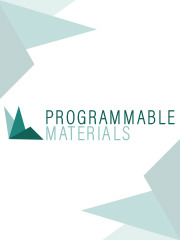- ISSN: 2752-8073 (Online)
- Frequency: 1 volume per year
Content preservation
Cambridge University Press publications are deposited in the following digital archives to guarantee long-term digital preservation:
- CLOCKSS (journals)
- Portico (journals and books)
Topic list:
Underlying molecular or mesoscopic architecture:
- material science / nano‐structures / nano‐materials
- metamaterials / architectured materials
- smart materials / advanced functional materials
- hybrid / biohybrid materials
- molecular machines / molecular sensors
- advanced microelectromechanical systems (MEMS)/nanoelectromechanical systems (NEMS)
Mechanisms and programming elements
- thermodynamics of non‐equilibrium systems / active matter / clustering / emergent behaviour
- mechanisms providing programmability, logical operations and functional dependencies
- bi- or multistable elements for materials memory processing and manufacturing routes for programmable functional elements
System implementation
- materials programming examples with (complex) system functionality
- evolving / shape changing / active / smart structures
- manufacturing processes for programmable materials / programming materials
- 4D printing
- soft robotics / self‐reconfigurable robotics
- autonomous & co‐operative machinery / robotics
- sensor networks / nano‐wireless networks
- synthetic biology and bioengineering morphogenesis / artificial life
System design and integration
- multi‐scale / reduced‐order / non‐local / data‐driven modelling
- inverse problems / optimization / topology optimization
- high‐performance computing.
This journal is owned, managed, and published by Cambridge University Press.
Programmable Materials is a gold open access journal supported by APC revenue.

